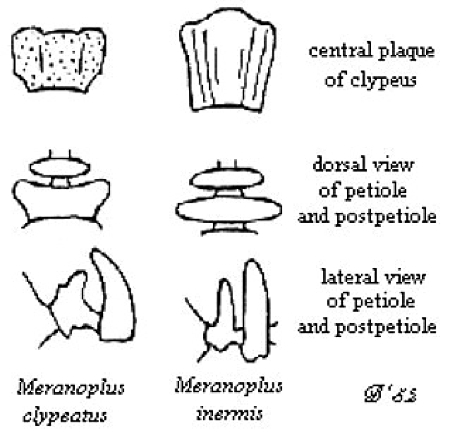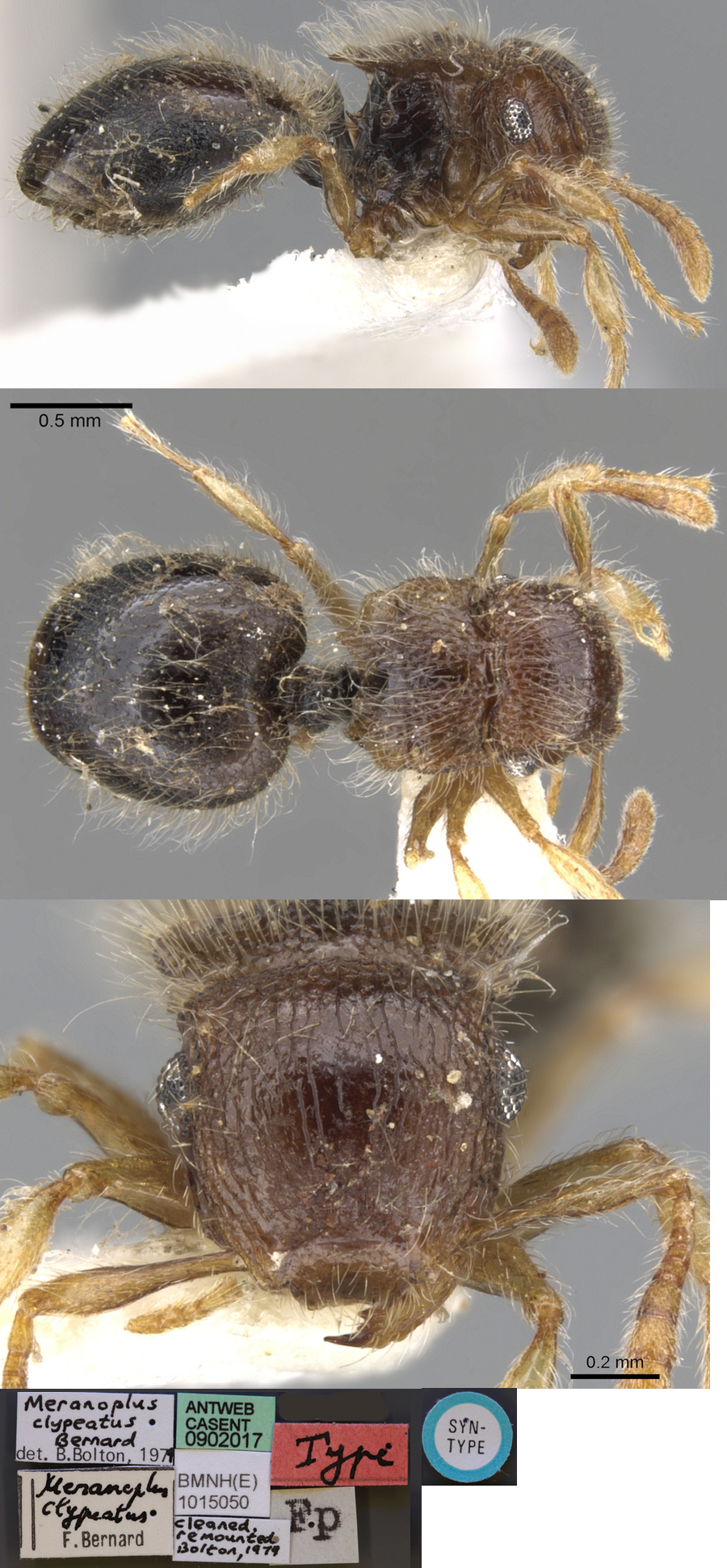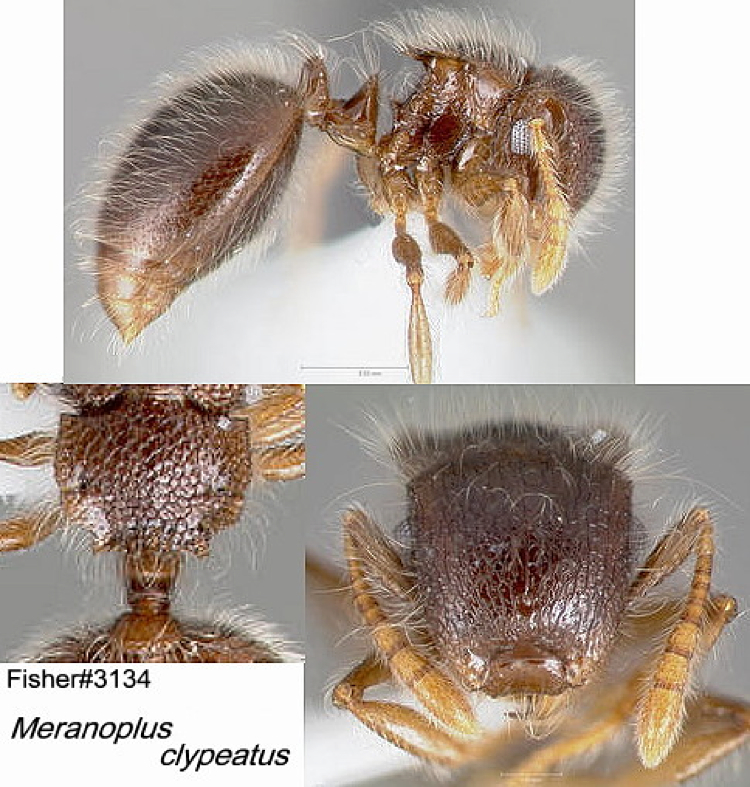Meranoplus clypeatus Bernard
  Type location Guinea
(Meranoplus clypeatus n. sp.,
Bernard, 1952: 244, illustrated, worker & queen); collected at Mt.
Nimba, six workers, station F, grassland at 1400 m; and, cotype worker
and delated queen grassland at 1550 m, by Lamotte; worker and queen
described (see Bolton, 1995). Type location Guinea
(Meranoplus clypeatus n. sp.,
Bernard, 1952: 244, illustrated, worker & queen); collected at Mt.
Nimba, six workers, station F, grassland at 1400 m; and, cotype worker
and delated queen grassland at 1550 m, by Lamotte; worker and queen
described (see Bolton, 1995). 
|
 WORKER
- TL 2.8-3.8 mm; differentiating features as in
key; postpetiole dorsum narrow but flattened, with rugose sculpture,
dense long yellow-white pilosity; colour uniform medium to dark brown,
appendages - scape reddish funicle lighter/brownish, tibiae and tarsi
yellow-orange (after Bernard, 1952; and, Bolton, 1981a: 52,
illustrated, series of variations in promesonotal shield). WORKER
- TL 2.8-3.8 mm; differentiating features as in
key; postpetiole dorsum narrow but flattened, with rugose sculpture,
dense long yellow-white pilosity; colour uniform medium to dark brown,
appendages - scape reddish funicle lighter/brownish, tibiae and tarsi
yellow-orange (after Bernard, 1952; and, Bolton, 1981a: 52,
illustrated, series of variations in promesonotal shield).
Separated by Bernard (1952) from other African species
by the distinct form of the clypeus and postpetiole. He differentiated
it from "nanus" (probably inermis, as he noted that was
the sole genus member from French West Africa, also Congo, Gabon,
southern countries), by the latter being brownish-red, with a larger
petiole and shaped as illustrated. The clypeus of clypeatus was
wider than long and shiny simply puncturate, with or more than 2
outlines to the lateral borders (other species longer than wide,
without puncturations, but with 6-10 large longitudinal rugae?).
Otherwise lateral extensions of thorax and antennal segments and length
as for "nanus". Petiole lower and more incurved in profile;
postpetiole very special, slightly cordiform, well incurved behind
(others straighter in profile).
Bernard's description (1952) is at 
|
Bolton's modern description (1981a) is at 
 Also
recorded from Zaïre, Kurukwata, nr Aba, by Myers (Bolton,
1918a). Also
recorded from Zaïre, Kurukwata, nr Aba, by Myers (Bolton,
1918a).
Wheeler (1922) listed a finding of nanus,
workers & queen, from Kindia, Guinea, by F. Silvestri (from
Santschi, 1914d: 351); that seems not to have been noticed by Bolton
(1981a), despite the then new description of the queen.
Santschi's description (my translation) is -
Queen (not previously described) TL 3.2 mm. Anterior wing 5.7 mm.
Middle of mesonotum smooth, remainder of sculpture slightly less strong
than on the workers. The propodeum has a toothed angle between the two
faces. Wings hylaine with pale nerves; remainder as the worker.
It seems likely that the specimens were actually clypeatus.
|
 The
photomontage of a syntype worker is collated from http://www.antweb.org/specimen.do?name=casent0902017 The
photomontage of a syntype worker is collated from http://www.antweb.org/specimen.do?name=casent0902017
|
Oxford University Museum
specimens
Meranoplus clypeatus
B Taylor det.
|
Cameroun
A Fotso Kuate
Sample 78
|
28.vii.2010
Nko’ondo
03°54'30" N
11°25'58" E
|
aphid survey
|
1
|
 |
|
 The photomontage is of a
specimen from Cameroun; Nko'ondo; aphid survey; 28.vii.2010;
coll. A
Fotso Kuate. The photomontage is of a
specimen from Cameroun; Nko'ondo; aphid survey; 28.vii.2010;
coll. A
Fotso Kuate.
|
 The
photomontage is collated from http://www.antweb.org/specimen.do?name=casent0003134 The
photomontage is collated from http://www.antweb.org/specimen.do?name=casent0003134
Collection details - Gabon, Prov. Oogové-Maritime, Réserve des
Monts Doudou; 25.2 km 304° NW Doussala; 2°13'63"S, 10°23'67"E, 600m.
19.iii.2000, collector S van Noort. Sweepp GA00-S141. Coastal lowland
rainforest; undergrowth, low canopy in rainforest.
|
|